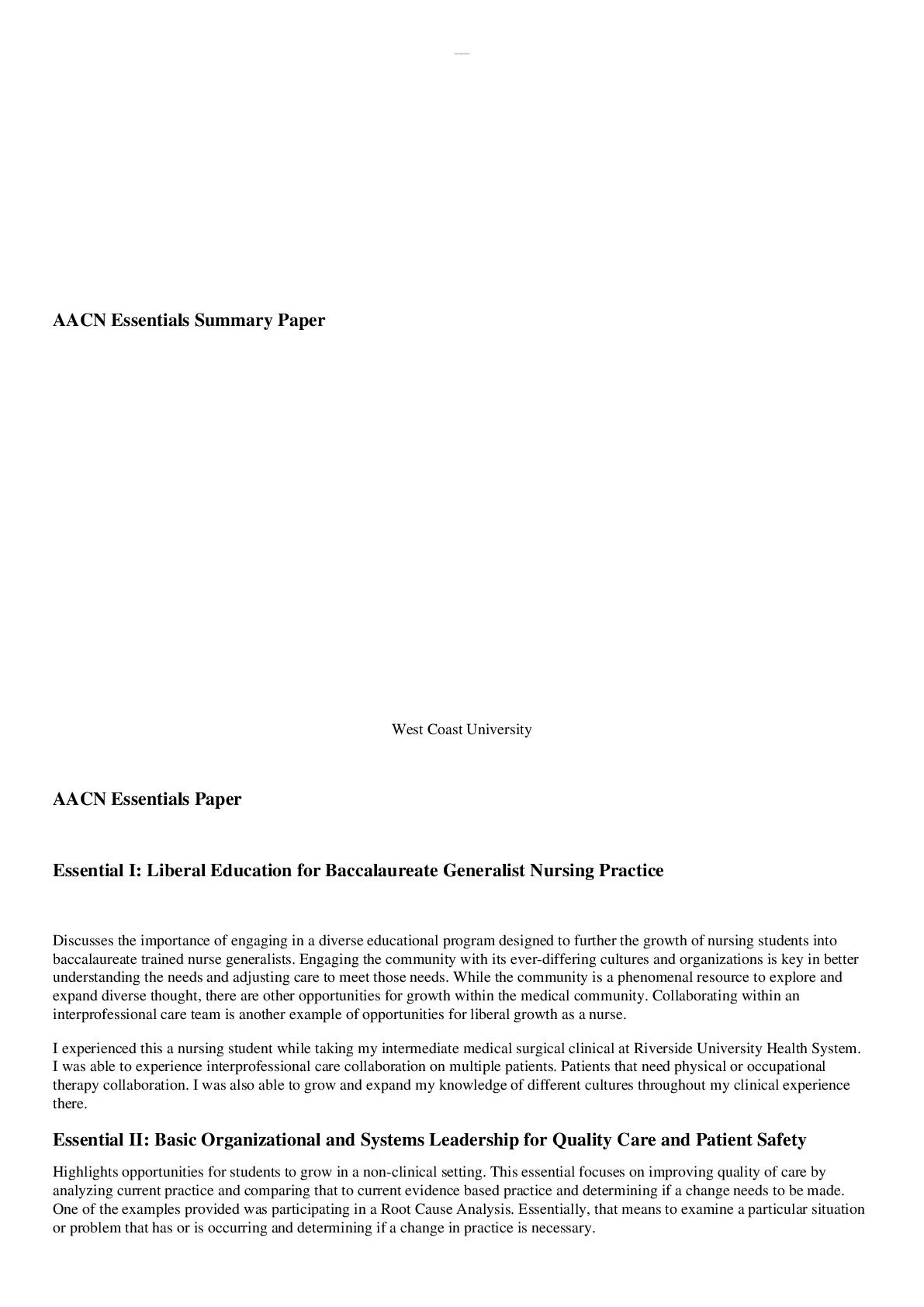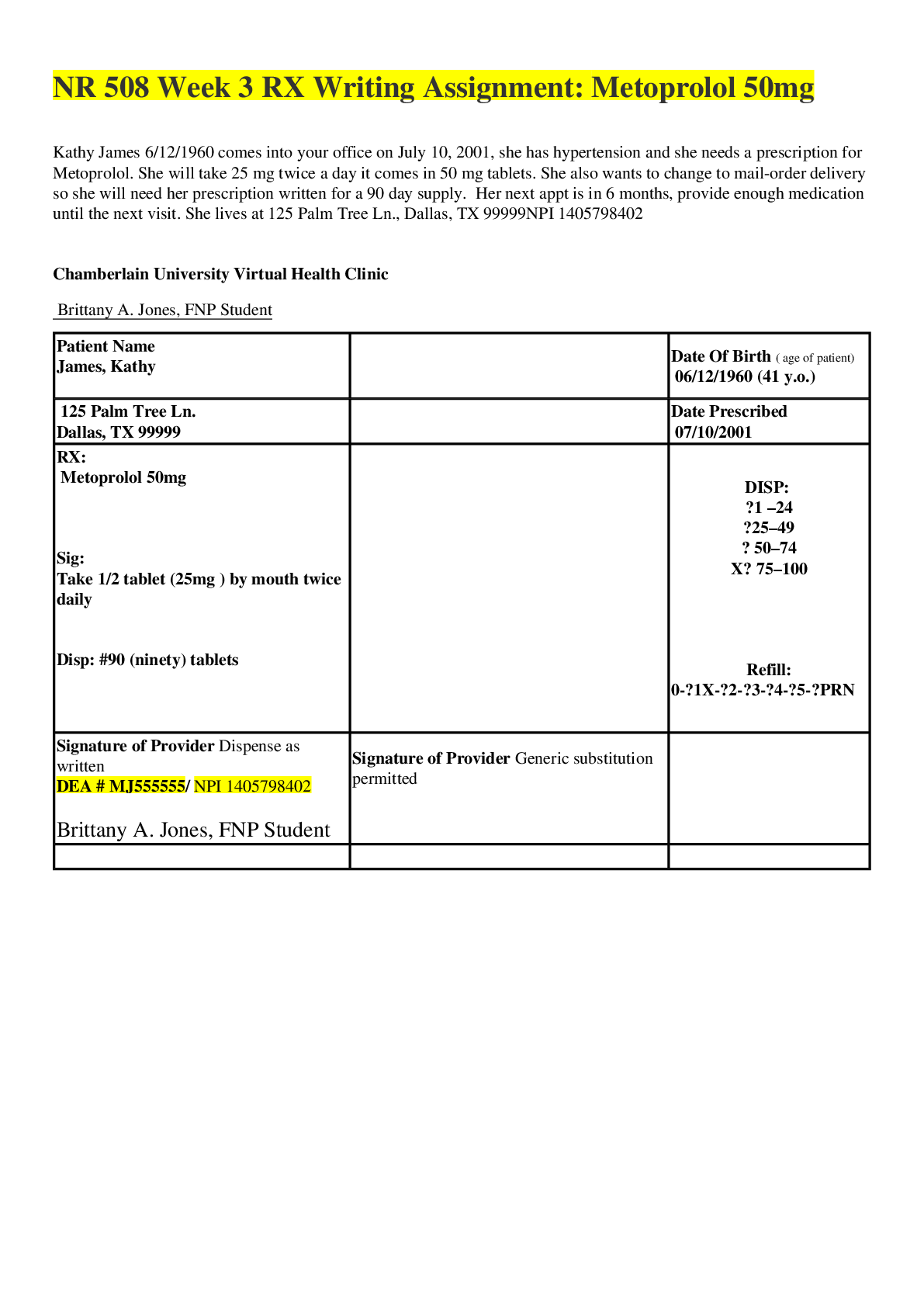Reflection
Reflection has become an extremely useful tool for advanced nursing students to learn from practice. This includes a detailed analysis of a clinical situation or cognitive activity, including description, cri
...
Reflection
Reflection has become an extremely useful tool for advanced nursing students to learn from practice. This includes a detailed analysis of a clinical situation or cognitive activity, including description, critical analysis, assessment, and planning. Through reflection, advanced nurse practitioners can review their practice and enhance their professional and personal skills and knowledge to ensure their ability to provide high-quality care. Since the 1980s, the concept of reflection as a strategy for personal and professional growth has been well documented (Pretorius, & Ford, 2016). In this paper, I will reflect back over the past eight the achievements of this course outcome that have prepared me to meet the MSN program outcome #4, the MSN Essential IV, and the Nurse Practitioner Core Competencies # 7.
Program Outcome #4: Integrate professional values through scholarship and service in health care. (Professional identity).
This course has helped to greatly facilitate and also give me the opportunity to develop knowledge in meeting the MSN program outcome #4. MSN program outcome #4, the requirement is integrating professional values through scholarship and service to health care (Chamberlain University, 2019). Health care is constantly changing, and this course has helped me to translate my current knowledge into practice, as well as helping me build confidence in taking care of all patients with varied health conditions. I also apply evidence-based knowledge and skills to deliver safe and high-quality care. Example of how I have integrated professional values through scholarship and service into health care is through my clinical experience. My clinical experience enhanced my communication skills to provide safe, high-quality, and patient- centered care. According to Zamanzadeh, et al. (2015), communication in healthcare is crucial in making clinical decisions to meet the physical, mental and spiritual needs of each patient and also establish mutual trust and respect between the health care provider and the patient. Through communication, I was able to educate patients about self-care and help them to understand their diagnosis and importance of compliance with medications and lifestyle changes to optimize the quality of the patient. During my clinical, I was able to provide patient-centered care to the patients. An example is an 18-year-old female who had diagnosis Anemia and was also morbidly obese. This patient was prescribed iron tablets for anemia. Knowing that iron pills contribute to constipation, I educated this patient and to drink plenty of water, include fiber in her diet and eat a lot of vegetables to minimize having constipation. As for her obesity, I educated her on lifestyle changes which include eating a healthy diet, including regular exercises to daily activities, relieving stress and making healthy choices.
Another example of translating my current knowledge into practice and applying evidence-based knowledge and skills to deliver safe and high-quality care was providing care to a 44-year-old African-American male newly diagnosed with hypertension. I used the knowledge I got from this course on diagnosing and treatment of hypertension. This patient was a newly confirmed diagnosis of hypertension, I used the JNC 8 guidelines we discussed in week 3 to determine treatment for this patient. I discussed the first line treatment of hypertension with this patient and
the reason this drug class is the recommended treatment for African-Americans, the function of the medication, and side effects. According to Williams et al (2016), patients with stage 1 hypertension, regardless of race, should be treated with lifestyle modification then start diuretic therapy along with lifestyle modifications. Education for lifestyle modification for this patient includes home BP monitoring, diet, exercise, and weight reduction, smoking cessation.
MSN Essential IV: Translating and Integrating Scholarship into Practice Recognize that the master’s-prepared nurse applies research outcomes within the practice setting, resolves practice problems, works as a change agent, and disseminates results.
Before I took this course, I always followed the routine of clinical practice at my clinical practice or place of work. My clinical practice was based on training, but not on evidence-based practice. This course helped me to look at different aspects of healthcare practice, particularly during my clinical rotation. Through this course, I have learned the importance of nursing research and evidence-based practice and how to use it as a guide in my practice. According to Black, et al (2014) states that research confirms that patient outcomes improve when nurses practice in an evidence-based manner. And evidence-based practice (EBP) has been shown to increase patient safety, improve clinical outcomes, reduce healthcare costs, and decrease variation in patient outcomes. In this course, I have experienced many patients situations in which I have been able to participate in course discussions with my Professor and classmates and apply evidence-based knowledge. An example is the Week 2 case discussion on a pulmonary assignment where I had to come up with evidence-based first-line treatment plan, including medications, labs, education, referrals, and follow-up for the patient. During discussions, the Professor asked thought- provoking questions that made me research and come up with evidence-based answers. This has better prepared me to develop and utilize research skills to provide quality care to the patients.
Also, this course helped me to have a better understanding of effectively working with my preceptor, effective interaction with the patients and collaborating care with other healthcare providers to provide high-quality patient-centered care. An example is a 15-years-old African- American female that came to the clinic and was diagnosed with STD (gonorrhea). This patient reported having only one sexual partner since she became sexually active one year ago. Her parents were not aware that the patient was sexually active. I encouraged the patient to talk to her sexual partner to come to the clinic complete testing and treatment. This patient reported that one of her sexual partners was in prison. I educated this patient on safe sex, STDs and the correct use of condoms. I notified my preceptor, and she collaborated with the prison healthcare staff to have the partner tested and treated. And also get information on all his sexual partners so they can also get treatment. With the permission of the patient, her parents were made aware of the patient’s diagnosis.
Nurse Practitioner Core Competencies # 7: Health Delivery System Competencies
1. Applies knowledge of organizational practices and complex systems to improve health care delivery.
2. 2. Effects health care change using broad based skills including negotiating, consensus- building, and partnering.
3. 3. Minimizes risk to patients and providers at the individual and systems level.
4. 4. Facilitates the development of health care systems that address the needs of culturally diverse populations, providers, and other stakeholders.
5. 5. Evaluates the impact of health care delivery on patients, providers, other stakeholders, and the environment.
6. 6. Analyzes organizational structure, functions and resources to improve the delivery of care.
7. 7. Collaborates in planning for transitions across the continuum of care.
I met the Core Competencies # 7, in a Family Practice setting. During my clinical experience, I realized that integrating evidence-based practice and clinical practice guidelines in a clinical setting can be challenging. However, I had to constantly review clinical guidelines which helped me to be able to analyze, interpret, and implement the findings during my clinical experience and also in class sessions. The class discussions we had in this course helped to improve my skills in critical thinking and provided me with adequate knowledge to be able to provide quality care to patients in a primary care setting. This actually helps me to develop confidence in communicating with my preceptor and other healthcare providers during the evaluation of patient care and clinical meetings. In this course, I learned the importance of mastering ethical principles in a way that influences better patient outcome taking into consideration the various factors related to the patient's needs, values, and preferences.
During my clinical experience, my preceptor emphasis the importance diagnosing and treating correctly, education of patient of diseases process, side effects and treatment, and accurately collaborating care with other healthcare providers to minimize double treatment and risk for the patient. I had the opportunity to care for patients from a diverse background which gave me an opportunity to learn how to address the needs of cultural diversity in the healthcare system. I also learned how organizational structure and management principles, including results, affect how an organization views its practices including, improving patient care and outcome, increasing the number of patients and strategies to reduce healthcare costs for the patients especially those without health Insurance.
To conclude, this course has equipped me with the tools and knowledge to effectively provide high-quality patient-centered care to my patients using evidence-based. I have learned that effective communication and collaboration amongst the healthcare providers helps to promote high-quality health care for the patient and decrease the risk for double treatment of the same health problem. Also, during this course, I have learned and adapted to doing better in providing adequate patient-centered care to patients of diverse background and religious beliefs. I had the opportunity to learn organizational structure and management to effectively meet the need of the patient.
References
Black, T., Balneaves, G., Garossino, C., Puyat, J. H., & Qian, H. (2014). Promoting evidence- based practice through a research training program for point-of-care clinicians. The Journal of nursing administration, 45(1), 14–20. Retrieved from https://www.ncbi.nlm.nih.gov/pmc/articles/PMC4263611/
Chamberlain University (2019). Chamberlain University academic catalog 2018-2019. Retrieved from https://www.chamberlain.edu/docs/default-source/academics-admissions/catalog.pdf? sfvrsn=366
Pretorius, L., & Ford, A. (2016). Reflection for Learning: Teaching Reflective Practice at the Beginning of University Study. International Journal of Teaching & Learning in Higher Education, 28(2), 241–253. Retrieved from https://search-ebscohost- com.chamberlainuniversity.idm.oclc.org/login.aspx? direct=true&db=ehh&AN=117547843&site=eds-live&scope=site
Williams, S. K., Ravenell, J., Seyedali, S., Nayef, S., & Ogedegbe, G. (2016). Hypertension Treatment in Blacks: Discussion of the U.S. Clinical Practice Guidelines. Progress in cardiovascular diseases, 59(3), 282–288. doi:10.1016/j.pcad.2016.09.004
Zamanzadeh, V., Jasemi, M., Valizadeh, L., Keogh, B., & Taleghani, F. (2015). Effective factors in providing holistic care: a qualitative study. Indian journal of palliative care, 21(2), 214-24.
[Show More]
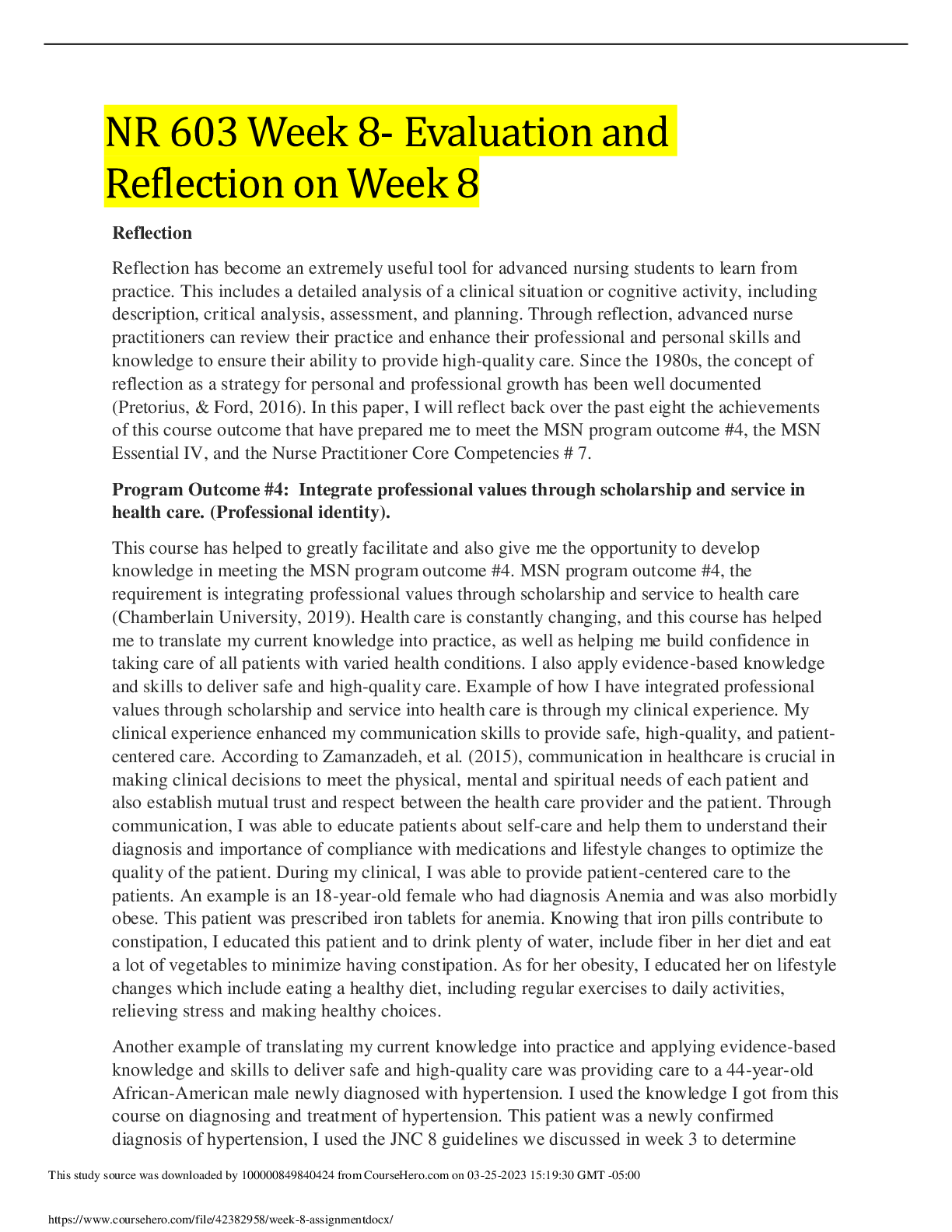



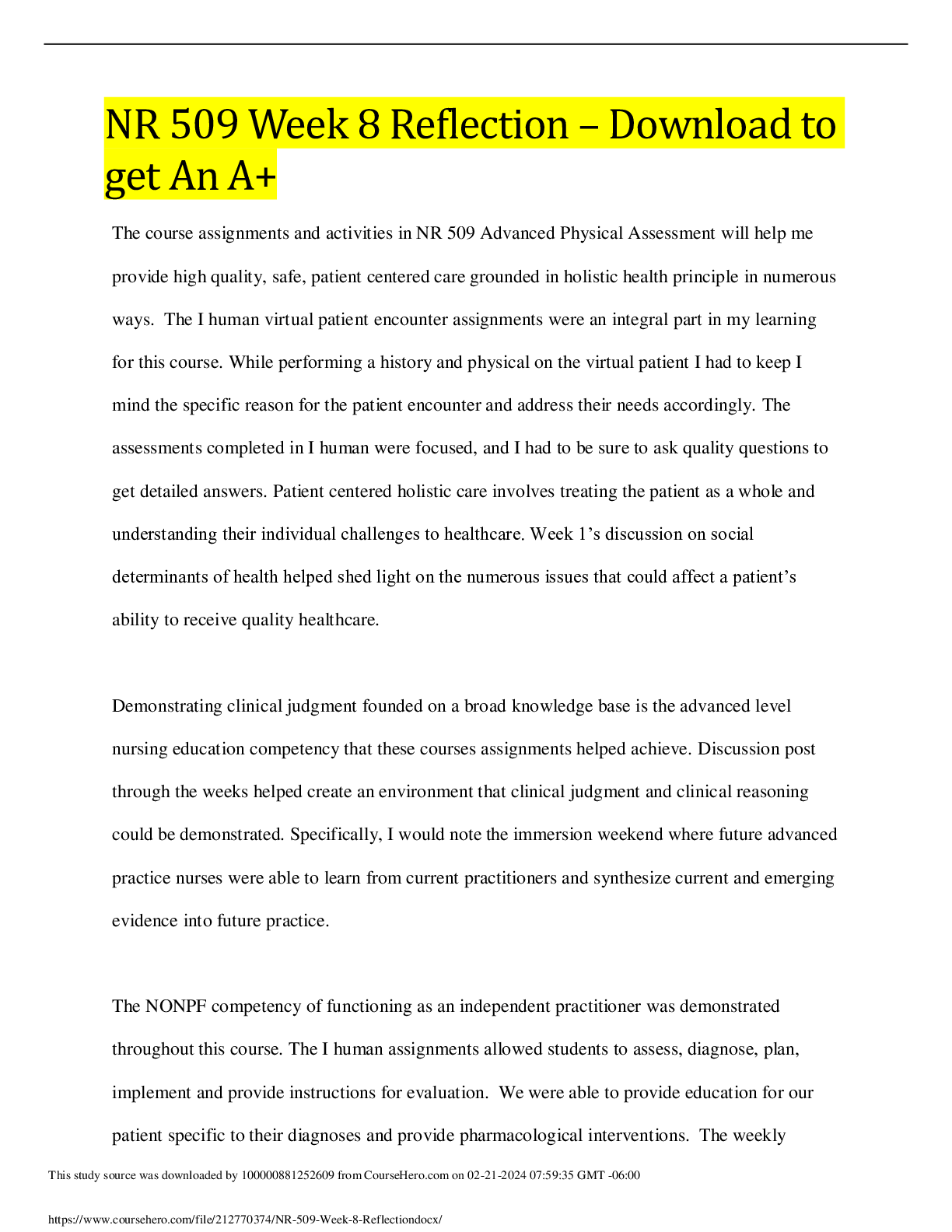
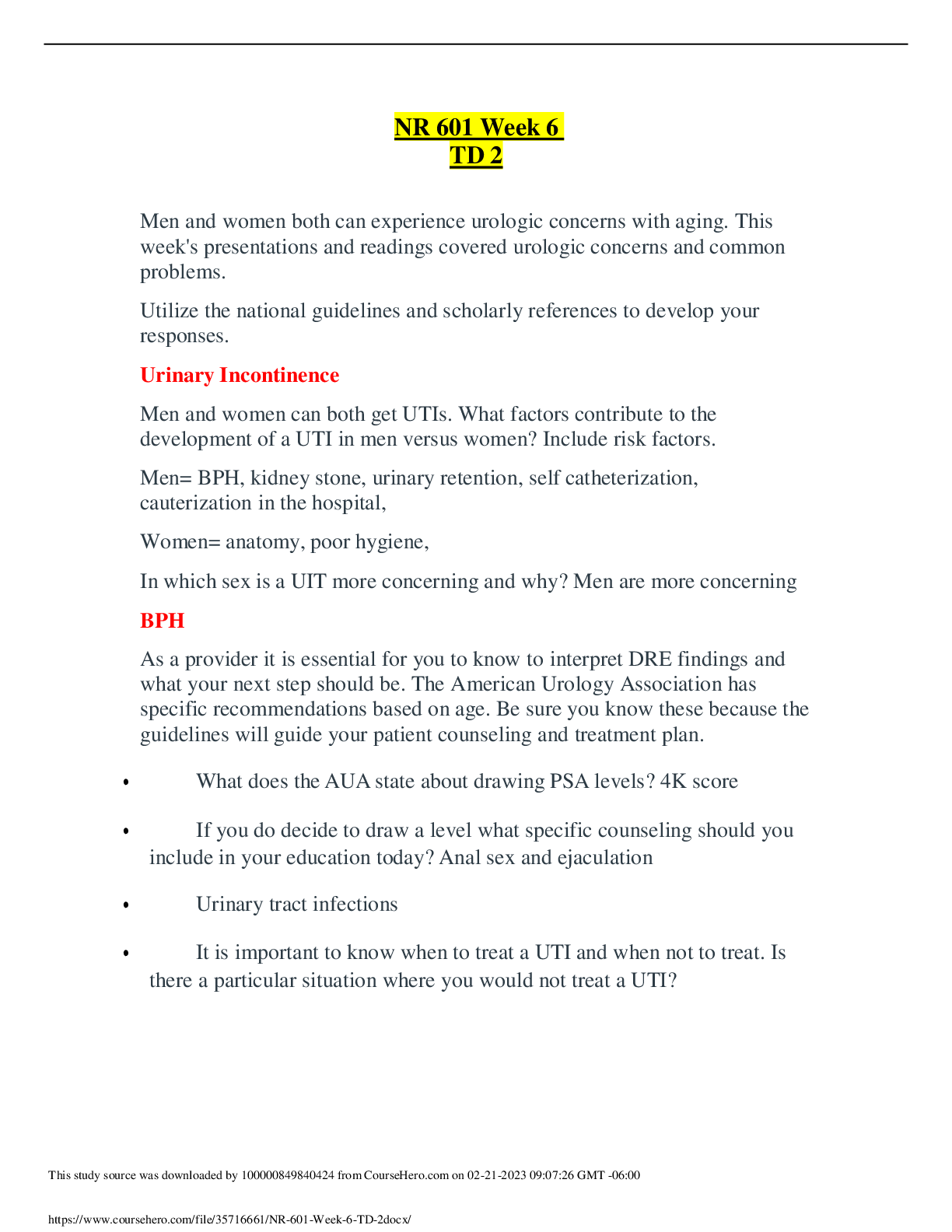
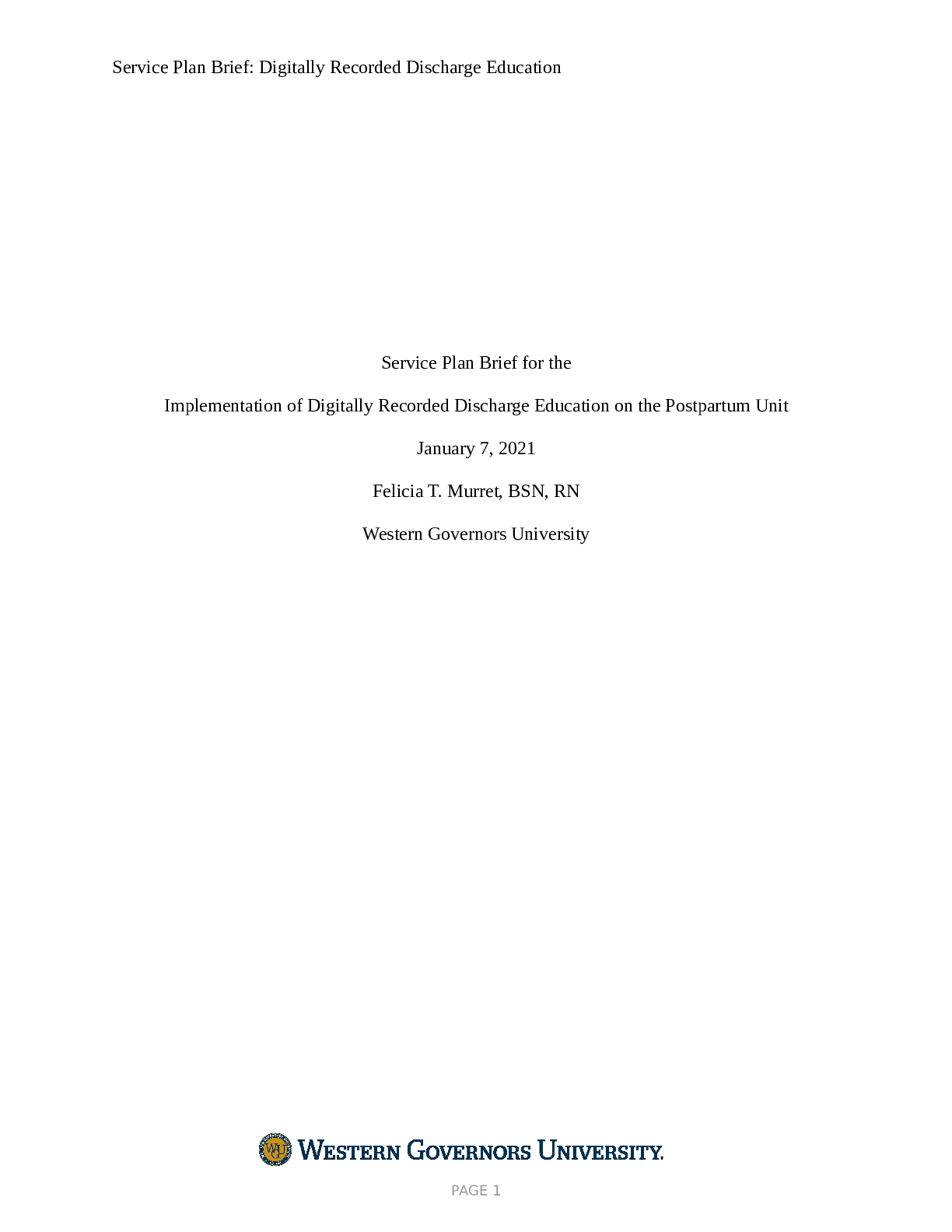
.png)

